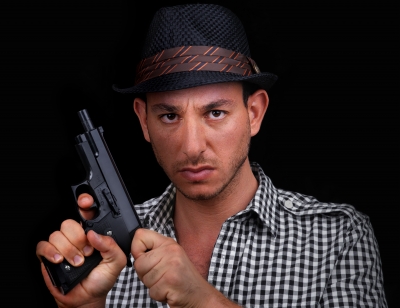I love: Antagonists.
Commonly known as villains, antagonists are experts at getting in the hero’s way. They’re much more interesting than protagonists. Through antagonists, a writer can live out his/her evil side. Planning and plotting Anty’s nefarious schemes is the best part.
What makes a great antagonist?
First, he has to have motivation. Just being evil isn’t enough. We all know at least one psychopath, and some of the things they do may seem random. There is always something behind it, however.
Image: Boaz Yiftach / FreeDigitalPhotos.net
The best antagonists have a reason for what they do. It could be as broad as Dr. Doom’s thirst for world domination, or as simple as the penmanship medal dear little Rhoda so desperately wants.
And Anty must believe, with all his twisted, rotten heart, that his actions are necessary. This lends depth to the character. It gives him conviction. People are complicated and Anty should be no exception. If he doesn’t care, neither will the reader.
Second, the reasons have to make sense. Rhoda, a child, would hardly dream of controlling the world. Nor would an adult Joker be happy merely pushing a kid off a wharf to get a class prize he failed to achieve.
Well, he might. You never know with Joker.
Finally, Anty should be capable of carrying out his plans. Mason Verger in Thomas Harris’ Hannibal is completely paralyzed, but he still manages to orchestrate a plot to kidnap and kill Hannibal Lecter that takes place across two continents. How? He’s insanely rich and can hire people to do all the work for him. If he were flat broke in a state hospital in Sheboygan, I doubt he’d have the resources.
I wish you could read Rose’s Hostage. I would so like you to meet Dale Conroy. I know it’s time to move on to the next villain, but he’s so awful you just love to hate him.
I plan to try some small presses. Maybe I can get on with one of them. If not, maybe I’ll just make a damn e-book and sell it here already. I’m already having fun with my next antagonist. Who? Sorry, if I told you I’d have to kill you. Heh heh heh.
—-
I hate: Adjectives.
I don’t actually hate them; what I hate is lazy writing that makes use of them rather than taking time to make better word choices. Especially when they come in strings. And I tend to do this in first drafts, although luckily I can take them out later. But this is harrrrrrrrrdd.
Example:
Joker’s skintight purple gloves touched her hot, feverish, rosy cheek, where the glistening moisture of salty, frightened tears still lingered.
Um…..
How about this?
His glove touched her feverish cheek, which glistened with frightened tears.
We already know Joker wears purple gloves. Hot and rosy aren’t needed, because we know feverish cheeks are hot and rosy. Ditto with salty. Frightened may or may not stay, depending on the point of view and what happened right before.
Or this:
His glove traced the path of frightened tears down one feverish cheek.
I like that one much better. You need a few adjectives to describe things, but don’t depend on them too much.



Hey, we’re talking about some of the same things! My theme for the whole challenge is all about villains–it’s good to know a) someone else shares my sentiments and i’m not totally crazy; and b) someone else likes comic book villains too.
I love the I Love/I Hate dichotomy and I think you’re right about Adjectives. Now I have to take a look at my own work…grrr…
Cool, Chris, I’ll have to check out your A-Zs!
I’m not a big comic reader–I have to slow down because of the pictures and it bugs me–but I have to agree they definitely have some of the most interesting antagonists. I guess it’s because they don’t have very many limits. They can be magic, from another planet, mutants, etc. When you’re writing a book with a more realistic setting, your antagonist has to stick to reality also. I must admit, having studied criminology, there is no end to what people do to victimize others. Lots of material there, unfortunately.
Good advice on both antagonists and adjectives. Too much description is too much. I sometimes wonder with villains because they’re really horrid, but they come from the imaginations of really good people. I wonder if authors ever re-read their villains evil deeds and think, “This character came from my mind?” Ah but it makes good reading. Thanks for the post.
Heh heh, I know. That’s why I mentioned the vicarious thing. Everyone has a dark side. It’s just that we writers have to be adept at tapping that and channeling it into our characters, without being caught up in it too much. If I’m feeling what my characters are feeling as I’m writing, then it usually turns out better.
Yay A to Z challenge! Can’t wait to see what else you come up with this year.
Thanks, Rukia! I’ll try to keep it interesting. :)
Thank you for the writing tips–I think that Mark Twain said that “if it sounds like writing, rewrite,”
A good suggestion, I think. I will be following your blog. I like the blocking idea, especially since I am a visual thinker the blocking idea will help.
Thanks, Natalie! Your blog looks interesting. I’ll add you to my list. :)
Mark Twain had a lot to say about everything. Most of it was pretty good. There are worse writers to emulate, but few better. :)